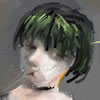I'm sketching out a strange hypertext story called Another World. It's an experiment. It's not finished -- it's barely begun -- and normally I wouldn't talk about it.
I'm writing about Another World here, in part, because it begins as a response to problems raised in this Weblog cluster during the past year. It starts from Anja Rau, and her disturbing questions about hypertext fiction: "Has it no tension? No excitement?" It starts from Torill Mortensen and her game response to my probes about games: "look at two decades of computer games and tell me everything we learn about, say, sexuality." It starts from Tim Parks' reminder in the October 24 NYRB that hypertext shouldn't be considered an infant any more; when movies were our age, they'd managed to accomplish a hell of a lot. It starts from long correspondence with Espen Aarseth. It starts from Jill Walker's reminders about the importance of Online Caroline.
Another World is a game. You are the Resident Administrator of a new Colony on Another World. You make the decisions. You choose what to build, and where. It's a little like SimCity. (It's loosely coupled and multiplayer; there are other colonies out there, and they can influence your colony. But they're a long way away...)
Another World is a hypertext. The most interesting thing about your Outpost is that it's filled with people. Your inbox is filled with memos, letters, and directives. You see people on the street, hear what they say, listen to their arguments and read their stories.
Another World is about ideas. It's got plenty of politics. Voices will be raised, tears may be shed, and people might take off their clothes.
 One of the big challenges for Another World is to find some new way to reconcile computer games and sex.
One of the big challenges for Another World is to find some new way to reconcile computer games and sex.